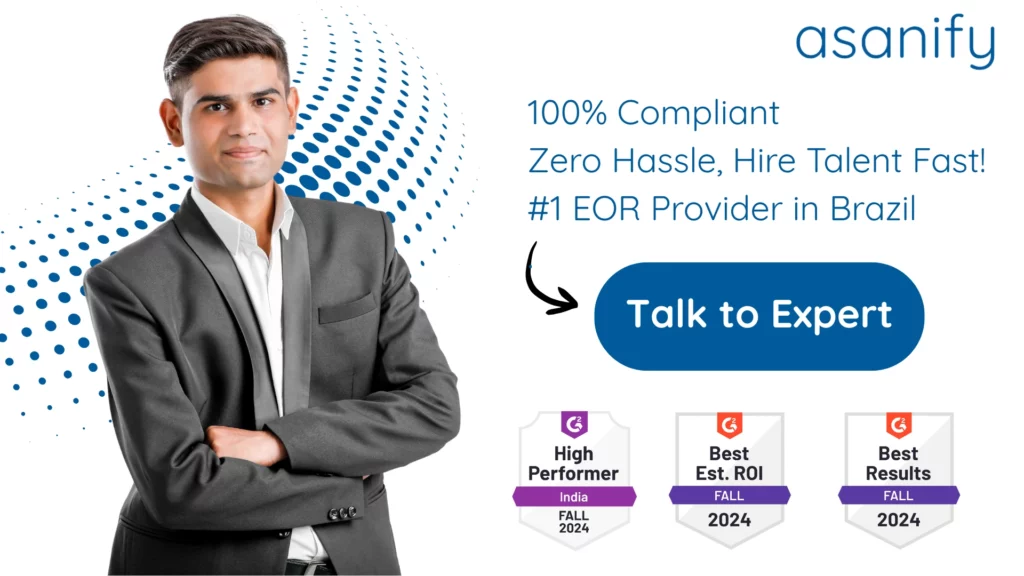Brazil’s fast-growing economy, large domestic market, and strong presence in industries like technology, energy, and agriculture make it an attractive destination for global employers. However, before hiring in Brazil, companies must understand Brazil’s work authorization process to ensure compliance with immigration laws and avoid costly delays. Partnering with an Employer of Record can simplify this process, helping businesses secure the right work permit and visa in Brazil while ensuring non-Brazilian employees are onboarded legally and efficiently.
Table of Contents
- Overview of Brazil’s Work Permit and Visa System
- Understanding Requirements and Eligibility
- Who Needs a Work Visa in Brazil
- Key Conditions for Obtaining a Brazilian Work Visa
- Employer and Employee Eligibility
- Types of Work Visas and Permits in Brazil
- Comparing Work Visa Types
- Advantages of the VITEM V (Temporary Work Visa)
- Application Process for Employers
- Required Documents
- Processing Timelines
- Employer Responsibilities and Compliance
- Legal Obligations
- Consequences of Non-Compliance
- Maintaining Ongoing Compliance
- Tips for a Smooth Application Process
- How an Employer of Record Can Help
- How Asanify Can Help
- FAQs
Overview of Brazil’s Work Permit and Visa System
Brazil regulates the employment of foreign nationals through a combination of labor and immigration laws overseen by the Ministry of Labor and Employment (MTE) and the Ministry of Justice (Federal Police and Immigration Department). The process differs based on the type of work, duration of stay, and employee’s nationality.
- Brazilian citizens and permanent residents – Can work without restrictions.
- Foreign nationals – Require a work permit and appropriate visa before starting employment.
- Employer-driven process – The employer applies for the work permit before the employee applies for a visa.
- Two-step system – Obtain work permit approval from the MTE, then secure a residence visa from a Brazilian consulate.
- Multiple visa categories – Short-term and long-term work visas depending on the contract type and duration.

Understanding Requirements and Eligibility
Before applying, both employers and employees should understand Brazil’s work authorization framework. The correct visa type depends on the job role, skill level, and length of stay.
- Determine whether the role requires a temporary or permanent work visa.
- Verify that the employer is registered and authorized to hire foreign workers in Brazil.
- Check if the employee’s qualifications meet Brazilian labor and immigration requirements.
Who Needs a Work Visa in Brazil
Any non-Brazilian citizen who is not a permanent resident must have a valid work visa to engage in paid employment in Brazil.
- Brazilian citizens and permanent residents – No work visa required.
- Unauthorized work can lead to deportation, fines, and entry bans.
- Even short-term paid assignments usually require a work visa.
- Most visas are employer-specific and tied to the approved job role.
- Dependents must apply for their own residence permits to work.
Key Conditions for Obtaining a Brazilian Work Visa
Applicants generally must:
- Have a confirmed job offer from a Brazil-based employer.
- Meet the position’s education and experience requirements.
- Provide proof of health coverage valid in Brazil.
- Maintain a clean criminal record.
Employer and Employee Eligibility
Employers must be legally registered in Brazil and authorized to hire foreign workers. Employees must meet professional qualifications set by the Brazilian labor authorities, which may differ by occupation.
Key Points:
- Employer must be compliant with Brazilian labor and tax regulations.
- Some roles require proof that no qualified local candidate is available.
- Credentials may need validation from Brazilian authorities.
- Non-compliance can result in application rejection.
Suggested Read: Labour Laws in Brazil: A Complete 2025 Guide
Types of Work Visas and Permits in Brazil
Brazil offers different visa options for foreign workers depending on the job nature and duration:
- VITEM V (Temporary Work Visa) – For employment contracts of up to 2 years, renewable.
- Permanent Work Visa – For long-term roles, often tied to high-level executives or specialized professionals.
- VITEM II (Business Visa) – For short-term business activities, not direct employment.
Comparing Work Visa Types
| Visa Type | Purpose | Duration | Notes |
| VITEM V | Temporary work | Up to 2 years | Renewable; employer sponsorship required |
| Permanent Work Visa | Long-term employment | Indefinite | For executives, researchers, and specialized roles |
| VITEM II | Business visits | Up to 90 days | No direct paid employment allowed |

Advantages of the VITEM V (Temporary Work Visa)
This is the most common visa for foreign employees in Brazil. It allows legal employment for up to two years, is renewable, and may lead to permanent residency depending on the role and length of stay.
- Suitable for contract and full-time employment.
- Multiple-entry privileges during validity.
- Can be extended without leaving Brazil.
- Allows dependents to apply for family reunification visas.
Application Process for Employers
The employer initiates the process by submitting a work permit application to the General Coordination of Immigration (CGIg) at the Ministry of Labor. Once approved, the worker applies for the appropriate visa at a Brazilian consulate in their home country.
Required Documents
- Signed employment contract in Portuguese.
- Copy of employee’s passport.
- Proof of qualifications and relevant experience.
- Employer’s registration and tax compliance certificates.
- Health insurance proof valid in Brazil.
Processing Timelines
- Work permit approval: 30–60 days on average.
- Visa issuance: 5–10 business days after approval.
- Total time: Usually 1.5–3 months.
Employer Responsibilities and Compliance
Employers must comply with strict labor and immigration rules when hiring foreign workers in Brazil.
Legal Obligations:
- Offer contracts that meet Brazilian labor law standards.
- Pay salaries in compliance with minimum wage laws.
- Register the employee with Brazil’s social security system (INSS).
- Renew work permits and visas on time.
Consequences of Non-Compliance:
- Heavy fines from labor and immigration authorities.
- Suspension from hiring foreign workers.
- Possible legal action and reputational harm.
Maintaining Ongoing Compliance
- Keep accurate employee records.
- Report any changes in employment status to authorities.
- Monitor permit and visa expiration dates.

Tips for a Smooth Application Process
- Ensure all documents are translated into Portuguese by a certified translator.
- Start the process early to avoid project delays.
- Verify that the employer’s labor and tax compliance is in good standing.
- Consider using an Employer of Record (EOR) for faster market entry.
How an Employer of Record Can Help
An Employer of Record in Brazil enables companies to hire and manage foreign talent without opening a local entity. The EOR becomes the official employer for legal purposes, handling payroll, benefits, compliance, and visa sponsorship.
Benefits include:
- Faster hiring without setting up a Brazilian subsidiary.
- Full compliance with labor and immigration laws.
- Localized payroll and benefits administration.
- Assistance with work permit and visa processes.
Suggested Read: Register a Business in Brazil: Everything You Need to Know
How Asanify Can Help
Navigating Brazil’s work authorization process can be complex, especially for international employers. Asanify offers a complete Employer of Record (EOR) solution, managing every step—from securing the correct work permit to managing payroll and HR compliance.
With Asanify, you can:
- Hire and onboard employees in Brazil quickly and compliantly.
- Ensure full compliance with Brazilian labor and immigration rules.
- Expand into Brazil without the cost and complexity of a local entity.
If your goal is to grow your team in Brazil efficiently, Asanify’s end-to-end support makes it easy to tap into South America’s largest economy.
FAQs
Temporary visas last up to 2 years, renewable; permanent visas allow indefinite stay.
Fees range from BRL 300–1,000, depending on visa type and duration.
Yes, but they must still hold the correct residence and work authorization.
The VITEM V (Temporary Work Visa).
It can, depending on the role and length of stay.
Yes, dependents can apply for family reunification visas.
The employee must stop working, and the employer must request renewal.
An EOR ensures compliance, manages payroll, and handles immigration without the need for a local entity.
Not to be considered as tax, legal, financial or HR advice. Regulations change over time so please consult a lawyer, accountant or Labour Law expert for specific guidance.

